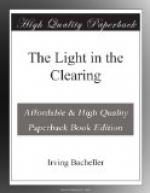I remember the sad excitement of that ride to the village and all the words of advice and counsel spoken by my aunt.
“Don’t go out after dark,” said she. “I’m ‘fraid some o’ them rowdies’ll pitch on ye.”
“If they do I guess they’ll be kind o’ surprised,” said Uncle Peabody.
“I don’t want him to fight.”
“If it’s nec’sary, I believe in fightin’ tooth an’ nail,” my uncle maintained.
I remember looking in vain for Sally as we passed the Dunkelbergs’. I remember my growing loneliness as the day wore on and how Aunt Deel stood silently buttoning my coat with tears rolling down her cheeks while I leaned back upon the gate in front of the Hacket house, on Ashery Lane, trying to act like a man and rather ashamed of my poor success. It reminded me of standing in the half-bushel measure and trying in vain, as I had more than once, to shoulder the big bag of corn. Uncle Peabody stood surveying the sky in silence with his back toward us. He turned and nervously blew out his breath. His lips trembled a little as he said.
“I dunno but what it’s goin’ to rain.”
I watched them as they walked to the tavern sheds, both looking down at the ground and going rather unsteadily. Oh, the look of that beloved pair as they walked away from me!—the look of their leaning heads! Their silence and the sound of their footsteps are, somehow, a part of the picture which has hung all these years in my memory.
Suddenly I saw a man go reeling by in the middle of the road. His feet swung. They did not rise and reach forward and touch the ground according to the ancient habit of the human foot. They swung sideways and rose high and each crossed the line of his flight a little, as one might say, when it came to the ground, for the man’s movements reminded me of the aimless flight of a sporting swallow. He zig-zagged from one side of the street to the other. He caught my eye just in time and saved me from breaking down. I watched him until he swung around a corner. Only once before had I seen a man drunk and walking, although I had seen certain of our neighbors riding home drunk—so drunk that I thought their horses were ashamed of them, being always steaming hot and in a great hurry.
Sally Dunkelberg and her mother came along and said that they were glad I had come to school. I could not talk to them and seeing my trouble, they went on, Sally waving her hand to me as they turned the corner below. I felt ashamed of myself. Suddenly I heard the door open behind me and the voice of Mr. Hacket:
“Bart,” he called, “I’ve a friend here who has something to say to you. Come in.”
I turned and went into the house.
“Away with sadness—laddie buck!” he exclaimed as he took his violin from its case while I sat wiping my eyes. “Away with sadness! She often raps at my door, and while I try not to be rude, I always pretend to be very busy. Just a light word o’ recognition by way o’ common politeness! Then laugh, if ye can an’ do it quickly, lad, an’ she will pass on.”




